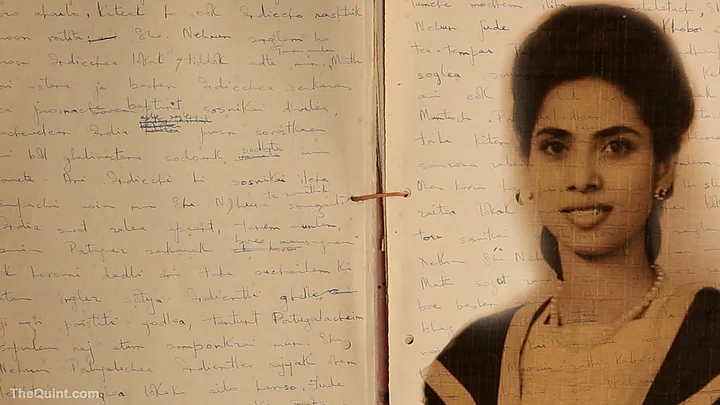Libia Lobo is ninety-five years old.
During Goa’s liberation movement, Lobo used to run an underground radio service called “Voz de Liberdade” in Portuguese, ‘Goenche Sadvonecho Awaz’ in Konkani and the “Voice of Freedom” in English.
The broadcasts started in 1955 from the jungles of Amboli bordering Goa.
Libia: The Hero
Sitting in her flat opposite Dominos Pizza in Panjim, Lobo shares a fascinating story about Goa’s liberation.
It all started in 1955, Lobo was living Mumbai. But her heart belonged in Goa.
Lobo remembers that on August 15, 1955, all three floors of the CJ Hall in Mumbai were packed with people wanting to register for a peaceful Satyagraha in Goa. The meeting was presided over by the then Maharashtra Legislative Assembly Speaker, Mr Kunte. Lobo recalls how during the meeting there was a report that Prime Minister Nehru had banned Satyagraha because those who had gone to the border to offer Satyagraha were fired upon at point blank range.
The spirits were dampened, she says. But the fight for Lobo had just started.
Colonised Goa’s Window to the Outside World
Goa had been completely cut off from the rest of India, says Lobo.
No news, no papers were coming into Goa, there were no civil liberties of any kind and the strictest censorship was imposed. You could not publish or do anything that was not aligned to the interest of the Portuguese.
During the liberation of Dadra & Nagar Haveli in 1954, the nationalists had found ammunition and had also seized two wireless sets. Lobo, along with Vaman Sardesai, who worked for the external services division of the All India Radio, decided to use the wireless sets as radio transmitters to end news censorship in Goa.
They set up an underground radio service inside a truck in the forest of Amboli in Maharashtra bordering Goa.
It was a leap in the dark. I was a sprightly Bombay girl. I did not know what I was in for. We were incognito and incommunicado, we met no one, we saw no one, nobody met us or saw us. And nobody knew where we were. We used to wear gumboots, but the leeches used to climb up the gumboots and bite us. When we came back from the broadcasts and remove our boots, our legs used to be bleeding. We also shed our blood for Goa.
The purpose of the radio was to keep people informed and inspired to fight for freedom, adds Lobo. She claims that through the broadcasts, they not only disbursed information but also aimed to lift the morale of the people by talking about the kind of support the freedom movement was getting from other parts of India and around the world.
The Portuguese tried their very best to stop the broadcasts, adds Lobo, but a slight change in the radio frequency would solve the problem.
The Last Broadcast
On December 16, 1961, Lobo and Sardesai received a message to inform the Governor-General that the Indian troops were moving in. They were asked to broadcast this message every hour to warn the Portuguese that an attack by the Indian Army was imminent. The army told them that the borders were no longer safe and a military Jeep was sent to pick up Lobo and Sardesai and move them to Belgaum.
The following morning, they set up their transmitters at a guesthouse in Belgaum.
On December 18, 1961, early in the morning, Lobo recalls that the then Chief of Army staff, General J M Choudhary informed that Dabolim airport was bombed and the Indian army had entered from all three sides. That evening, at the Army Headquarters, it was announced to all the journalists that the Portuguese had surrendered.
Early next morning, we were sent up on a plane with a loudspeaker on its belly. We hovered all over Goa for two hours. At 11 am, the tricolour was hoisted, we declared from the plane that Goa was free. We dropped leaflets to tell people. We asked people to rejoice because after 450 years we had won our freedom.
Post the liberation of Goa, Lobo was asked to go through Portuguese documents that were seized by the Indian Army. She came across a Rodregues’s report which stated that ‘The Voice of Freedom’ had done a lot of damage with their anti-Portuguese propaganda.
It was the voice that hurt us at close range is what the report said. That was the idea and we had successfully achieved it.
Libia Lobo later married Vaman Sardesai. He is no more.
She lives alone in Panjim, she doesn’t have any children and doesn’t keep a domestic help, the former she says is fate, the latter she adds are a bother.
